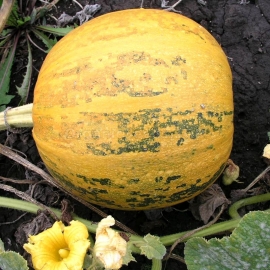
«Lola» - Organic Pumpkin Seeds
1.14 €
Unique appearance. The medium to small, 5 to 8 pound pumpkins are eye- catching orange with green stripes, great for displaying, plus they have the added bonus of large, dark green hulless seeds that make delicious 'pumpkin nuts' when roasted.
-
Ukrainian Heirloom pumpkin «Lola»
Unique appearance. The medium to small, 5 to 8 pound pumpkins are eye- catching orange with green stripes, great for displaying, plus they have the added bonus of large, dark green hulless seeds that make delicious 'pumpkin nuts' when roasted.
Also a source of pumpkin seed oil that some European studies show promotes prostate health. Semi-bush, short-vined plants.
How to grow
Timing
Direct sow or transplant in late May or early June when soil warms up. For transplants, start seeds indoors during the first two weeks of May. Make sure plants go into the ground no later than June 15th. Optimal soil temperature for germination: 25-35°C (68-95°F). Seeds should sprout in 7-14 days.
Starting
Sow seeds 2cm (1″) deep. Sow 3 seeds in each spot you want a plant to grow and thin to the strongest plant. Space plants at a minimum of 90-120cm (36-48″) apart in rows 120-180cm (48-72″) apart. If starting transplants indoors, consider using the 12-cell plug inserts.
Growing
Ideal pH: 6.0-6.8. These big plants need lots of food! Choose a sunny spot with fertile, well-draining soil. Dig in a generous quantity of finished compost and/or composted manure. Dig in 1 cup of complete organic fertilizer under each plant. All pumpkins grow male flowers first, then the female flowers are produced. The female flowers have tiny fruits at the base of the petals and require pollination by bees, mostly. Incomplete pollination is common at the beginning of the season, and results in small fruits that are misshapen at the flower end. Discard these damaged fruits before they rot.
For the largest pumpkins, feed weekly throughout the growing season with fish or kelp based fertilizer. Keep the huge plants well watered, particularly in hot weather. Always water the soil, and avoid any form of overhead watering other than rain. Fruit will grow larger if you keep only one fruit per vine. As the fruit develops, try to gently encourage it to grow at a 90° angle to the vine itself. The largest pumpkin varieties will grow on their sides.
Harvest
Like other winter squash, pumpkins are mature when they have coloured up well and their stems are crisp. For the best sugar content, cut the stem about 4cm (2″) or so from the body of the fruit. If the weather is dry, allow the pumpkins to cure in the field for 10 days, or in a warm room for 4-5 days. Bring pumpkins in under cover before rain.
